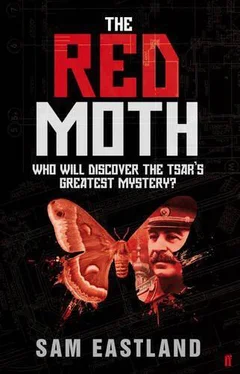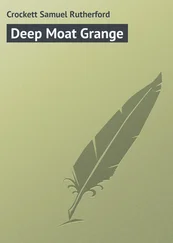Sam Eastland - Red Moth
Здесь есть возможность читать онлайн «Sam Eastland - Red Moth» весь текст электронной книги совершенно бесплатно (целиком полную версию без сокращений). В некоторых случаях можно слушать аудио, скачать через торрент в формате fb2 и присутствует краткое содержание. Жанр: Исторический детектив, на английском языке. Описание произведения, (предисловие) а так же отзывы посетителей доступны на портале библиотеки ЛибКат.
- Название:Red Moth
- Автор:
- Жанр:
- Год:неизвестен
- ISBN:нет данных
- Рейтинг книги:3 / 5. Голосов: 1
-
Избранное:Добавить в избранное
- Отзывы:
-
Ваша оценка:
- 60
- 1
- 2
- 3
- 4
- 5
Red Moth: краткое содержание, описание и аннотация
Предлагаем к чтению аннотацию, описание, краткое содержание или предисловие (зависит от того, что написал сам автор книги «Red Moth»). Если вы не нашли необходимую информацию о книге — напишите в комментариях, мы постараемся отыскать её.
Red Moth — читать онлайн бесплатно полную книгу (весь текст) целиком
Ниже представлен текст книги, разбитый по страницам. Система сохранения места последней прочитанной страницы, позволяет с удобством читать онлайн бесплатно книгу «Red Moth», без необходимости каждый раз заново искать на чём Вы остановились. Поставьте закладку, и сможете в любой момент перейти на страницу, на которой закончили чтение.
Интервал:
Закладка:
Suddenly, like a golem taking shape out of the earth, a figure rose up from the grass behind Engel. It was Stefanov. With two long strides, he crossed the ground between himself and Engel.
Too late, Engel turned, alerted by the sound of footsteps on the road.
There was a sharp crack as the butt of Stefanov’s rifle connected with the side of Engel’s head.
The professor collapsed in a heap into the ditch.
Leaning over the unconscious man, Stefanov removed Engel’s Luger from its holster and tucked it into his belt.
Pekkala, meanwhile, walked over to the place where Lieutenant Churikova had fallen. She lay on her back, returning his stare. A layer of dust had settled on her eyes.
‘I heard what he told you,’ said Stefanov. ‘What are you going to do‚ Inspector?’
‘Do you think you can carry the professor?’
‘Yes. I’m sure of it.’
‘Then you should set off now‚ back towards the Russian lines.’
‘But what about you, Inspector? Aren’t you coming with us?’
‘There is something I must do first‚’ replied Pekkala.
Stefanov pointed towards a hillside in the distance. ‘I’ll wait for you on the crest of that ridge.’
‘Go quickly,’ said Pekkala, ‘someone might have heard the shooting‚ and it’s only a matter of time before they come to investigate.’
Without another word, Stefanov set off towards the east, with the professor slung over his shoulders in the way a man carries a deer that he has hunted down and killed. The going was not hard. He weighed less than Barkat had done.
It took Stefanov about twenty minutes to reach the base of the hill. There, he stepped beneath the canopy of trees and began making his way up to the ridge. The ground was soft and strewn with fallen leaves, causing him to slip and lose his footing several times. The professor groaned as he slowly regained consciousness.
On the crest of the hill, Stefanov found a clearing that looked out over the valley below. Here he stopped to rest, rolling Engel off his shoulders and into a bank of dried moss.
Engel’s eyes fluttered. Lifting himself up on one elbow, he looked around blearily.
‘Do you speak Russian?’ asked Stefanov.
The professor turned to see a man in a tattered German uniform, sitting with his back against a tree, covering him with his own gun.
‘Yes,’ replied Engel. ‘Who are you?’
‘I am Rifleman Stefanov, sole survivor of the 5th Anti-Aircraft Section of the Red Army’s 35th Rifle Division.’
‘You’re the one who came here with Pekkala.’
Before Stefanov could reply, a hollow boom sounded in the distance. Both men turned to see a ball of fire rising from the fields. The flames were capped with thick black smoke, which Stefanov knew must have come from a gasoline explosion. It took only a second’s calculation for Stefanov to realise that the location of the blaze was exactly where he had last seen the Inspector.
Engel had reached the same conclusion. ‘The amber!’ He leaped up from his bed of moss. ‘Does he realise what he’s done?’
‘You can ask him yourself when he gets here, which shouldn’t be long now. Now sit down before I shoot you in the leg. I don’t want to have to carry you all the way to Moscow.’
Stunned, Engel flopped down again on to the ground. The blood had drained out of his face. ‘He did it‚’ muttered the professor. ‘He actually did it.’
They waited.
Stefanov kept his eyes glued to the point on the horizon from which he knew Pekkala would be coming. He stared until his eyes dried out. As the minutes passed, and the Inspector did not appear, he began to worry that something might have gone wrong.
Engel no longer seemed to care what was happening to him. He sat with his face in his hands, elbows resting on his knees, mumbling to himself in words too soft to hear.
When half an hour had gone by and Pekkala had still not arrived, Stefanov climbed to his feet. ‘We have to go back.’
Slowly, Engel raised his head. ‘Back there? To the truck?’
‘I’m not leaving him.’
‘Are you insane?’ Engel demanded. ‘We can’t go back. It won’t be long before the whole countryside is crawling with German soldiers looking for that convoy.’
‘I thought you would be glad of that,’ replied Stefanov.
‘You don’t understand,’ Engel told him. ‘I already sent a telegram to Berlin, telling Hitler that the panels are now safely in our possession and on their way to Konigsberg, where they will wait until construction of the Linz museum has been completed. That amber was my responsibility. Hitler will kill me himself when he learns what has become of it. Take me to Moscow. I have all the information Stalin needs to know about art acquisitions by the German Army in the Soviet Union. Just get me out of here before those horsemen come looking for us!’
Stefanov pointed to the cloud of smoke, which now had almost disappeared into the sky. ‘Not without Pekkala.’
‘You’re out of your mind,’ snapped Engel.
‘But not out of bullets!’ replied Stefanov, waving the Luger in his face.
The two men clambered down the slope, the professor stumbling over roots and mud in his polished knee-high boots. Running the rest of the way to the place where Engel’s convoy had been halted, they covered the distance in less than twenty minutes.
By the time they reached the truck, the fire had almost burned out. The spilled fuel had ignited, wrenching the vehicle apart. The windscreen had melted out and only springs remained of what had been the seats. The doors had been blown off completely. One of them lay in the ditch and the other was nowhere to be seen. The rear section of the truck was only a skeleton now, its wooden floorboards and its canvas roof incinerated in the blaze. The grass on either side of the road had been scorched down to the bare earth. It continued to smoulder, smoke drifting across the ground.
‘Where are the remains of the amber?’ asked Stefanov.
‘Destroyed,’ Engel replied bitterly. ‘What did you expect?’
‘But there’s no trace of it, or the panels. Wouldn’t there be something left?’
‘Not after a fire like this,’ Engel told him. ‘The panels were made of wood which had been treated with linseed oil to make it weatherproof. Linseed oil is highly flammable and amber itself is a resin, with a melting point under 400 degrees Fahrenheit. This fire must have burned at twice that heat. And amber isn’t like glass or precious metals, which would leave a residue. It burns away to nothing. It’s gone, Rifleman Stefanov‚ along with your beloved Inspector Pekkala‚ who is probably on his way back to Moscow, intending to blame you for this.’
‘No.’ Stefanov was staring at something on the ground. ‘He’s lying over there.’
In front of the truck lay a body, which had been caught in the blast and consumed. Only a husk of flesh and bones remained, the legs shrivelled to sticks inside the carbonised leather of the boots. Soot covered the carcass like a layer of black velvet.
‘How do you know that’s him?’ asked Engel, unwilling to approach the incinerated corpse.
Stefanov bent down and rummaged in the brittle fans of what had been a rib cage.
‘What are you doing?’ demanded Engel, his voice filled with revulsion.
Stefanov gasped, his fingers searing as they closed around the object of his search. Out of the ashes, he lifted the frame of a revolver. Its handle had remained intact due to the fact that the grips were made of solid brass, which had not melted. The cartridges contained in the cylinder had ruptured, skewing the barrel. But there was no mistaking Pekkala’s Webley. ‘The vapours from the gasoline must have exploded before he had a chance to get clear.’ Then he reached into the coat pocket and removed the scorched remnant of Pekkala’s NKVD pass book. ‘It is him,’ whispered Stefanov. ‘This proves it absolutely.’
Читать дальшеИнтервал:
Закладка:
Похожие книги на «Red Moth»
Представляем Вашему вниманию похожие книги на «Red Moth» списком для выбора. Мы отобрали схожую по названию и смыслу литературу в надежде предоставить читателям больше вариантов отыскать новые, интересные, ещё непрочитанные произведения.
Обсуждение, отзывы о книге «Red Moth» и просто собственные мнения читателей. Оставьте ваши комментарии, напишите, что Вы думаете о произведении, его смысле или главных героях. Укажите что конкретно понравилось, а что нет, и почему Вы так считаете.











